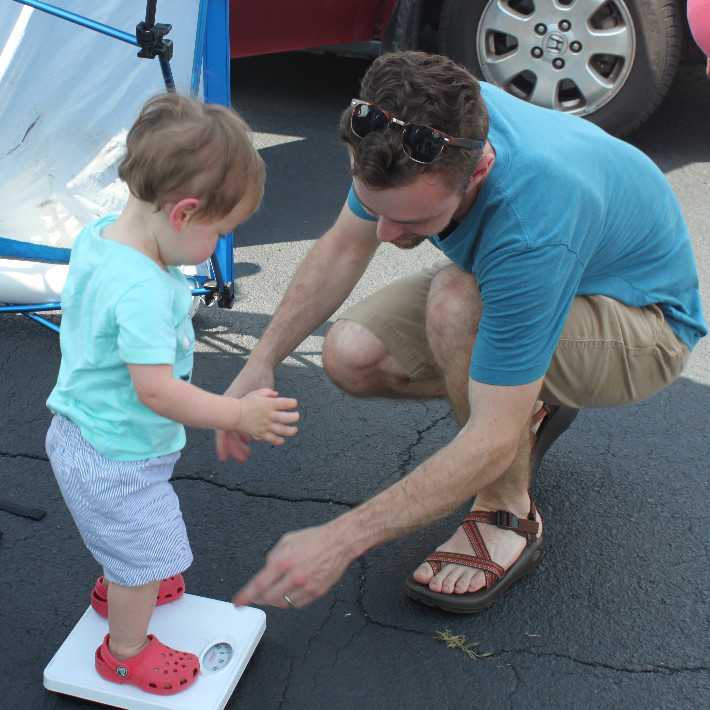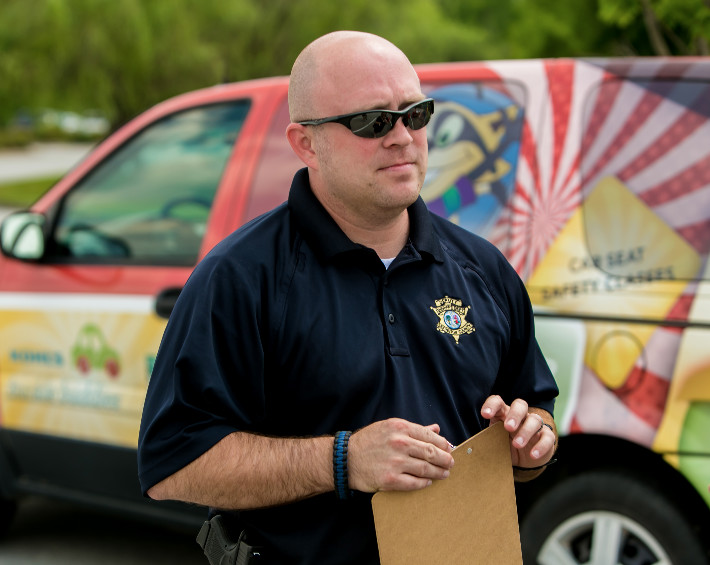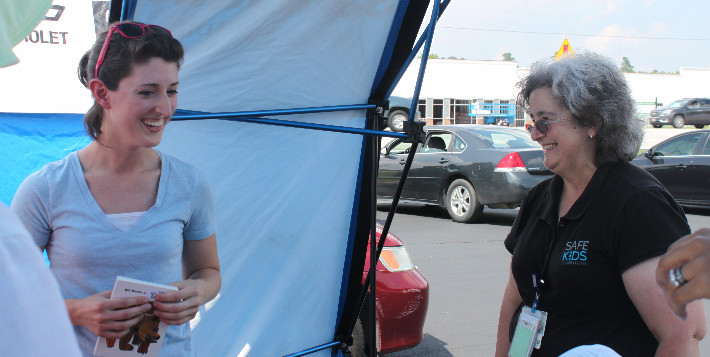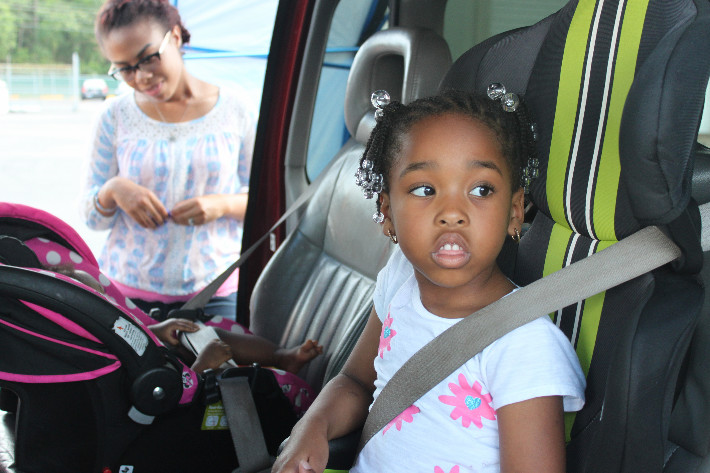Children’s Trust, home to Safe Kids South Carolina, is working with the Department of Health and Environmental Control to train more child passenger safety technicians around the state. Neil White, who tells the stories of Children’s Trust, attended recent car seat check events in Columbia and Sumter to watch newly-certified technicians install seats for children while informing parents of proper procedures.
Matthew Moore appreciates having peace of mind when driving his 16-month-old son Adair in the family van.
That’s a big reason why he and his wife Jean stopped at a recent car seat check in Sumter to make sure Adair’s car seat was properly installed. As state leaders in child passenger safety, Safe Kids South Carolina and DHEC hold these events to cap three-day training sessions for volunteers who want to be certified technicians.
According to the National Highway Traffic Safety Administration, 85 percent of people in South Carolina install car seats incorrectly. Moore, who calls that figure “heart-breaking,” wants to be on the right side of that percentage. Having certified technicians step him through the process is important to him.
“Safety is the main concern today by having people who certified telling us how to do it. I can put it in and think it’s fine, but in actuality, it may not be fine,” Moore said. “When you’re talking about moving kids from one seat to another as they get older and bigger, you’re concerned about your children in case something happens to the car. You want to make sure they’re safe, and that’s why we wanted to come. We wanted to make sure that we knew how to put it in.”

Matthew Moore helps weigh his son, Adair, to determine if the youngster’s seat is the proper size.
Other numbers point to the need for properly-installed car seats. Motor vehicle crashes are the leading cause of death and injury for children over one year of age. When properly installed, child safety seats can reduce the risk of death by 71 percent for infants and 54 percent for toddlers.
Children’s Trust has worked diligently with DHEC throughout the state to provide training and continuing education for car seat technicians. These volunteers, many of them first responders like firefighters, law enforcement and EMTs, learn how to properly install a wide variety of car and booster seats for the many different ages and sizes of children. Because of these training efforts, South Carolina has seen a 6.5 percent increase in the number of certified car seat technicians since last November, which upped totals to 941 technicians and 28 tech instructors in the state.

Jeff Miller, Lexington County Sheriff’s Department
Jeff Miller, a deputy with Lexington County Sheriff’s Department who works in Batesburg, took the certification training because he wanted to show residents there that he’s prepared to do more than make arrests and write citations. “We have a lot of community-service oriented things to do, and this is one more I can add,” he said.
Angela Jenkins, who works with the Department of Social Services in Lexington County, wanted to become certified because it’s important for DSS workers to know how to properly transport a child safely. “I learned a lot in the class, and I can take back that knowledge so I can train our workers,” she said.
Candace Keefe, who works in the Palmetto Health Tuomey nursery in Sumter, decided to become a technician because she helps send new babies home in new cars seats every day. “Now I can put somebody in a car seat and let them know they’re going home safely,” she said.
There were 12 trainees in Columbia and eight in Sumter completing the recent certification process – part of 25 trainings in the state this year that will give a two-year certification to participants, who must work one community event and earn six continuing education units to renew their certifications after two years.
The certification trainings combine classroom instruction, indoor and outdoor hands-on activities, skills assessments with car seats and vehicles, and a community safety seat checkup event
Safe Kids coalitions across South Carolina are pushing to get more volunteers trained to serve every part of the state. Kevin Poore, coalition coordinator at Safe Kids Midlands, which is located at Palmetto Health Children’s Hospital, helps run the three days of classes during the certification process.
“There are areas of the state where nobody is trained, and people don’t have access to the folks with the necessary knowledge to put in these car seats correctly,” Poore said. “So it’s really important. The more people we have out out there, the more access we can give to parents. Considering the misuse rate in South Carolina is extremely high with car seats being installed incorrectly, we’re trying to reduce that and give people the tools they need to do this correctly.”

Safe Kids Sumter County’s Cheryl Jackson (R) discusses car seat safety with parent Jean Moore.
The child passenger safety technicians in this state – part of almost 39,000 nationally – are making an impact in communities with seat checks and information-sharing, as parents and caregivers receive education and hands-on assistance about the proper use of child restraint systems and seat belts.
Cheryl Jackson, the coalition coordinator at Safe Kids Sumter County, credits the program with making children safer in automobiles in this state. Safe Kids Sumter County, which works out of Palmetto Health Tuomey, is funded by the Tuomey Foundation.
“Knowledge is power, and the more people who have knowledge, the safer our children are going to be,” Jackson said. “There’s a lot about car seats that folks generally don’t know, and and when technicians get that information, they can pass it to parents. They’re looking for correct information, and by being a child passenger safety technician, you’re able to give that to folks and let them know how to keep kids safe.”

Child passenger safety technician Arianna Jacobs helps check the car seats of Jamariya and Jachyera.
Cynthia Maple was driving down Broad Street in Sumter with her daughter and two granddaughters when they spotted the car seat check event. They took advantage of the opportunity by pulling in to get the seats checked for 5-year-old Jamariya and 8-month-old Jachyera. She was thankful to have a group of newly-minted techs going over both seats.
“We wanted to make sure they’re in a safe seat in case we’re ever in an accident,” Maple said. “This is for all kids, but especially my babies.”
Children always ride…
- In the back seat and not in front of an air bag,
- In a car seat that fits the child’s age, height and weight,
- In a car seat that has been installed in accordance with the vehicle and car seat instruction manuals, and
- In a car seat that has all of its parts, labels and instructions and has never been in a crash.
Using the proper seats
- Babies younger than 2 years old use rear-facing car seats.
- Children who are older than 2 years old and have outgrown the weight and height limits for the rear-facing seat use forward-facing car seats.
- When the child’s height and weight are more than the forward-facing limit for the car seat, children use booster seats.
- A child who is at least 4-foot-9 and has outgrown the booster seat height or weight limit is ready to use the seat belt without a booster seat.






